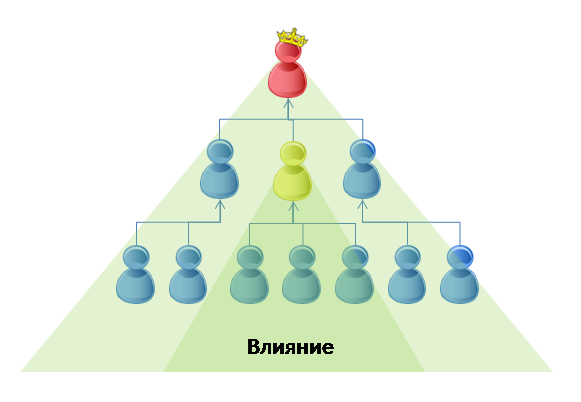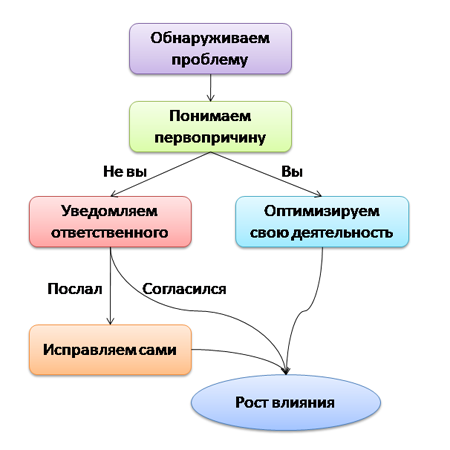Career Architecture

On Monday (they say - the most depressive of the year), habrovchane!
After the publication of this article , many people noticed that I was a bright careerist, and they began to ask me for advice on how to ensure career growth in the IT industry. In order to avoid repeating the same advice to different people in personal messages, I write this article, sharing in it the history of my own career growth and the main observations that I have made over 13 years of experience in large and not very large companies.
Immediately I warn you that I do not pretend to present the universal theory of career growth of a spherical horse in a vacuum, and most of the comments are twisted with the prism of my perception. What has worked repeatedly in my case does not necessarily work in yours.
Briefly about my career achievements, so that it was something to compare.
I got a job as a student when I was in my third year and immediately writing full-time GUIs on Qt for Linux. I’ve seen Linux one and a half times while my brother was training me to go to work. Prior to that, he had academic knowledge in C ++ and C, so by the level of knowledge he was the most malicious newcomer. Literally four months later, I became de facto (but not de jure) the leading developer of the project on product migration to ncurses. So de facto, that I painlessly quarreled with my immediate superior on the use of STL in base classes, and in this conflict, the higher authorities took my side, not his side.
Since then, I persistently swore with all my superiors, and despite this (or maybe because of this) my career and salary went up. For 13 years of service, I have increased my salary 15 times (on average 23% per year), although I myself actively demanded an increase only two times:
')
And now thinking how I did it.
Since then, I persistently swore with all my superiors, and despite this (or maybe because of this) my career and salary went up. For 13 years of service, I have increased my salary 15 times (on average 23% per year), although I myself actively demanded an increase only two times:
- Because I was promised after a trial period and forgotten
- Because I needed a minimum bid for obtaining a work permit for a highly qualified specialist (HQS), which made it easier for me to apply for registration in Moscow. This second time, the manager didn’t even ask what kind of promotion I’m asking for - he just wrote a letter to the accounting department so that I would be promoted as much as I needed.
')
And now thinking how I did it.
Career Reflections
First, what is a career? For many, career and salary are almost synonymous. There is a lot of misunderstanding on this non-obvious synonymy. Many people, when they quit, advocate a lack of career prospects, although in reality they mean “I want more bubble”. Probably because it’s indecent to talk about money in society. And a career is so sublime!For me, this synonym has never been. Yes, I was pleased when they raised my salary, and yes, at the appraisals, I hoped that they would raise it. Yes, I would tell the boss everything that I think about him, if I knew that everyone had raised my salary, except for me. And all the same, for me the salary has always been something secondary. The consequence of something else. It is precisely what constitutes the essence of a career. Namely - the influence . I extended my influence in order to have more opportunities to get the final result.
Career growth is the expansion of its area of influence. And it is logical that the wider your influence, the more you get paid. No matter why - out of gratitude or out of fear of losing you. But the fact remains:
No career growth without expansion of influence.
Peter Hierarchies and Principles
It so happened that in our civilization a hierarchy was chosen to manage large organizations and processes. Those. many others are subordinate to one node. The higher the knot, the more influence it has. Those. by our definition, the higher he is on the career ladder.
In such organizational structures, the principle formulated by the Canadian hierarchical researcher Lawrence Peter is valid. The principle is:
In a hierarchical system, any employee rises to the level of his incompetence.
The rationale is simple: if you deserve a promotion, you will be promoted. If not, you will occupy the position you hold. The proof is entertaining, but without special reservation, in general, is incorrect. After all, there is an option that if a person does not cope, then he is fired. However, the very essence of the hierarchy is such that finding out whether a given node copes with its responsibilities is such an expensive operation that it is often sacrificed for other activities. Roughly speaking, instead of analyzing how subordinates work, the manager will give out kicks and teams that he receives from his manager in the same way. From this whole story we make the most important conclusion:
Your boss does not know and is not particularly eager to learn how you work.
Drum master
Of course, there may be exceptions, but I was not lucky enough to cross with them.The fact that the bosses do not seek to find out how their subordinates work is evident if only from the fact that attestations are made analogous to the census of the population in large organizations. If the chiefs did not slaughter their subordinates for the quality of work, universal certification assessment would not be necessary - just a competent boss, seeing the efforts and competence of his subordinate, would himself take the initiative to increase it, and the loafers who accumulate a great many in any large organization would be same expelled.
In management theory, by the way, concern about the career growth of a subordinate is one of the most important points. In theory. For 13 years, none of my managers have bothered with my career. Even though I was lucky, and I had a wonderful American manager. Not once did he discuss with me the prospect of my career growth. Although my case is special (details below). But he also did not discuss career prospects with my colleagues.
Star Manager
There are bosses who have people grow like mushrooms after rain. They have the largest number of employees in the department with the prefixes senior, lead, experienced, advanced, super-duper and their various combinations. As a rule, these bosses are also on the drum, as their subordinates work, and they inflate their people for their own sake, since the star team, of course, must also be controlled by a star. Woe to the one who got the "star" manager. Nothing puts a cross on my career (in my understanding) as a conceited manager. It is difficult to calm down your own vanity, when your manager all of a sudden declares that people from other teams cannot hold a candle to you. I know what I'm talking about - I experienced such a suggestion on myself.If your manager praises you from scratch, run away from him! He inflates you!

Career ladder, not an escalator
Career growth is provided by a career ladder, not an escalator. If you want to be at the top, you have to go yourself, and not wait for someone to bring you there. And this is determined by a single word - the initiative. A rolling stone gathers no moss. If you do not take the initiative to expand your sphere of influence, it will not expand by itself. This is where the main intersection is located when choosing the path of expansion of the sphere of influence:- Careerist path
- Professional way
Careerist path
Immediately make a reservation that this is not the way I walked (naturally!), So I judge him by observing others. The keynote of this path is the formula:To expand the sphere of influence, it is necessary to influence the boss.
Careerist affects the boss in all possible ways. Manifested zeal manifests itself, sucks up, engages in window-dressing, claps eyes, shows different parts of the body (if they are beautiful), and so on. The ultimate goal is to get the opportunity to push through to the boss his ideas on the dedicated channel. Since the boss is a signal amplifier, this is how the expansion of the influence of the careerist in the organization is achieved.
The path of a careerist can be called by vertical wagging:

The disadvantage of the careerist is that his influence on the team is colored in the tone of the boss. Colleagues feel the taste of the chief in the ideas of his classmate and feel sincere dislike and contempt for him. Most often, careerists are not particularly annoying, as they rise to the top, leaving the enemies outside the sphere of their interests. Well, the dog with them, with careerists, as Ivan Vasilyevich would say.
Professional way
The professional expands its influence horizontally.
The professional formula is:
In order to expand my sphere of influence, it is necessary to solve the problems that prevent me from achieving efficiency.
The professional considers the team as a source of problems that he can solve. There is one very important point to which attention should be paid. Speaking about the problems to be solved, it is not about the tasks that the employee has been running from above, but about the problems that make the achievement of their immediate duties ineffective. Most often, these problems emerge as a result of the question: “Why am I engaged in this nonsense?”, I.e. This is a search for the root cause of the problem from the point of view of the company. This is a fundamental moment of a mental exit from its context, followed by an expansion of influence, followed by career growth.
Influence on the chief is achieved within the framework of your extended influence on the whole environment. The boss will know that you work well because everyone will know about it. Therefore, it is no surprise to anyone when you are promoted. After all, it is overdue.
An additional bonus to the professional approach is that the employee expands his expertise in various areas. Instead of going deep into his field, taking the task given to him for an axiom, he learns the context of its appearance. Find out what people live, who thought of it. He recognizes and often even makes his task more correct, since he understands the context.
Professional vs. Specialist
If I call a professional a person who goes from the problem to the top, looking for its root causes, thereby expanding its range and sphere of influence, then an expert in my understanding goes in the opposite direction - he is digging deep. The specialist is not interested in why the problem arose, he wonders how to solve it. As a result of this deepening, the specialist receives a deep knowledge of his subject area, so deep that no one except him understands how cool he is. In this lies the secret of the complexity of an attestation specialist: only another specialist of his level, whom his manager obviously is not, can understand his qualifications. Thus, the best that his boss can think of him is “doing some kind of magic.” He is compelled to judge the degree of power of magic by indirect signs - the silent respect that his colleagues have for a specialist. However, let's not forget that for this, the manager needs to take the initiative, what managers in hierarchies do only in theory.I do not in any way want to prove that specialists are worse than professionals. I'm just trying to illustrate why so many good specialists are underestimated by their superiors.
So, the conclusion:
Narrow specialization is not conducive to career growth.

Algorithm of professional career growth
So, having forgotten about careerists, we formalize how the expansion of professional influence is achieved, which, as mentioned above, leads to career growth.
1. Detect the problem
If something in your activity or in the activities of your colleague caused you a healthy WTF question ?, it means that you have a chance to expand your sphere of influence and grow in your career.2. Identify the problem
Track the problem to its root cause. If it is in you, eliminate it by sim upgrading your skills. Exit from the algorithm. Most often the problem is not in you (you are perfect, aren't you?). Explore where it grows from. Most often, problems are in the blurring of someone's eyes or his lack of competence (hello to Peter's principle). Learn. This study and enhance your skills.3. Advise a solution
Having found the one in whose sphere of responsibility the joint is lying, describe to him (here it is - the initiative!) The essence of the problem and how it manifests itself at your level. Think of and make available other potential problems that may come up due to this joint. Most likely, by the way, they have already surfaced, which the bugtracker will tell you. Anyway, advise a colleague how to fix this joint. If a colleague agrees, you did a good deed for the company, received a grateful associate, i.e. somewhat expanded the scope of their influence. And at the same time received new knowledge outside your area. By the way, at the same time you fixed the joint by someone else’s hands, which is also quite gratifying.It should be recognized that most often a colleague will send you to hell. People in hierarchies are already overloaded with all sorts of responsibilities in order to be engaged in useful work. But I still recommend handling advice, even if you are anticipating a turn from the gate. This is important so that later they could not be accused of raiding the sphere of influence, because you will have an iron "I told you (a)."
One way or another, if we are refused, we proceed to the most important step:
4. Do the work of others
Correct the found jamb themselves, even though he is in someone else's area of responsibility. Firstly, it will give you the opportunity to test your hypothesis, secondly, you will correct the problem itself, and not a symptom that should inspire even in isolation from the rest of the theory - you made the world a better place!Anyway, if you were right, people will quickly notice the improved process. People will quickly get used to the innovation, taking it as the norm, not being able to return to the previous state, which was also considered the norm. You just became irreplaceable, congratulations!

From de facto to de jure
It should be understood that according to the above algorithm, you will always be underpaid. After all, you will be loaded all the time with responsibilities for which others receive money. But this situation has several advantages:- Since you are already doing this work, getting it legally is not difficult, since you have already proved your worth
- You are free to move in the direction that you are most interested in, as you see the whole range of potential paths of development.
- You are a free artist. The company understands that you are doing much more than you receive, so you are allowed to do what is not allowed to others. For example, you can potroll president

Final Thoughts on Career
Companies and groups are different. What I described worked in all groups where I worked, and there were 5 such people. In all these groups I received exclusive freedom, so I could say what I think, as one-on-one as well as publicly, to the owners of companies . It should be recognized that at the dawn of my career, I came across a rather inadequate boss, which led to my leaving the company, which led to career and financial growth in another.The main secret of the path I have described is that you grow from the inside, and your career just chases your growth. As a child grows up from children's pants, so you grow out of your current position. The child does not grow up because he is given pants larger in size. Career is the clothes you wear. You are your qualification, and it must grow first. And where to grow it, show the problems that impede your company.
The described career growth algorithm is a consequence of your professional growth. And since you are a professional, you will fit everywhere. After all, as you can outgrow your children's pants, you can also outgrow your current company. And grow to your own. After all, no matter how striking, about the same words Bodo Schaefer and Eric Rees describe the line of conduct of a successful entrepreneur.
PS
If it is interesting, I can write a short essay about Vasya and Petya in the comments for clarity, who were simultaneously employed in a software company, and Vasya grew quickly, but Petya did not.
Source: https://habr.com/ru/post/209668/
All Articles